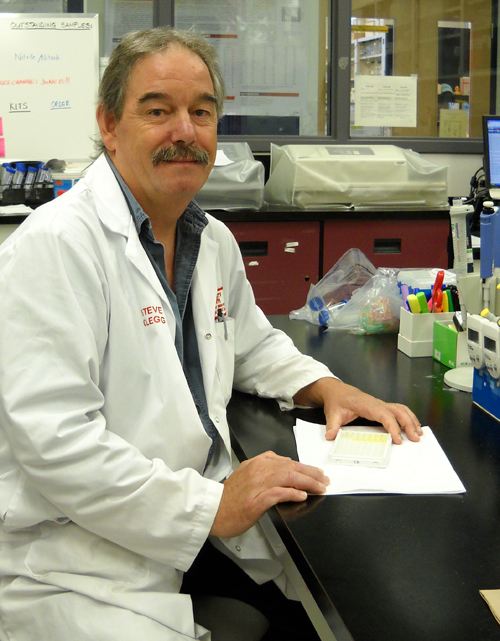
Steve Clegg is a detective of sorts, one who uses science to look for clues to help answer questions and sometimes even solve mysteries.
He rarely knows the whole story behind what he’s investigating. In fact, when there’s a mystery involved, more often than not he has no idea he’s helping to solve a case until after the fact.
And that’s the way it’s supposed to be.
Clegg is the supervising scientist in the immunochemistry section of the University of Guelph Agriculture and Food Laboratory (AFL). He and his team, Christine Blaser and Julie Denys, spend their days testing for the presence of allergenic components in food products.
Their clients range from food producers confirming product quality and/or checking for contamination to consumer groups to even the coroner’s office trying to determine what might have triggered a fatal allergic reaction.
Clegg and his team test for things such as eggs, milk products, peanuts, gluten (found in wheat, cereals and other grains) and crustaceans (shellfish). These are some of the major food allergens that can be detected and quantified using a variety of enzyme-linked immunosorbent assays (ELISAs).
They always know what they’re looking for on a client’s behalf. They just may not know why. A few years ago, for example, the lab tested some cooking oil from a school cafeteria for traces of peanut and dairy products (none were found). Only later did Clegg learn that the oil was part of the investigation into the death of Sabrina Shannon, a 13-year-old Pembroke, Ont., girl who died in 2003 after eating french fries from her school cafeteria.
Investigators eventually determined that the tongs used to serve the fries had probably also been used to make poutine, and the traces of cheese curds left behind were enough to send the teen into anaphylactic shock. Her death led to the passage of Sabrina’s Law, which requires all school boards to reduce risk of exposure in classrooms and common school areas.
“We knew nothing about the story at the time we tested the oil,” says Clegg. “It was only afterwards, after the news came out, that we became aware of our involvement.”
AFL has been conducting allergen testing for almost 10 years. It has received accreditation from the Standards Council of Canada to test for milk, egg, gluten, peanuts and almonds. The lab also tests food products for sesame, soy, shellfish and mustard — the majority of Health Canada’s priority allergens.
Some of its testing is considered routine. For example, a food company may be ensuring that its production line making regular and lactose-free products is operating correctly without cross-contamination. Or a company may have recently switched suppliers and is practising due diligence. Clegg says companies can test the food directly to see if it contains allergens, or they can test swabs to evaluate how effectively they are cleaning surfaces. Such tests have a turnaround time of five to 10 business days.
Same-day testing is also available. “A company might be in crisis mode, on the verge of a recall,” says Clegg, whose lab has tested for products involved in recalls numerous times over the years.
An analytical chemist who has worked for AFL for more than 25 years, Clegg completed his PhD at Guelph in environmental biology after earning a bachelor of science degree at McMaster and a second honours B.Sc. at U of G. He considers himself to be a “concierge of ELISA.” As a doctoral student, he developed an ELISA to detect the herbicides dicamba and glyphosate in water.
The immunochemistry section also provides ELISA methods for other substances in food, including antibiotics, veterinary drugs, mycotoxins, pesticides and other chemical contaminants such as melamine. The lab also has new tests under development for microcystins and acrylamide.
Clegg hopes the lab will one day be equipped to go beyond just helping to provide numerical answers and solving mysteries.
“I’d like to see us get involved in the clinical side as well, being able to interpret what we’ve detected, so that we’re providing more than just the results.”